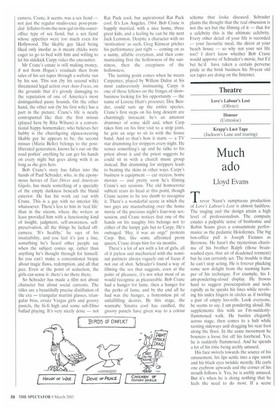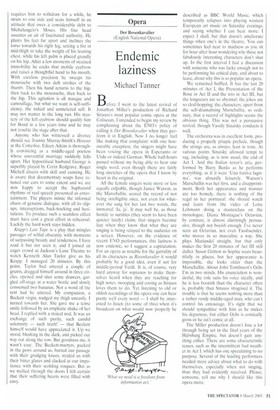Much ado
Lloyd Evans
Trevor Nunn's sumptuous production of Love's Labour's Lost is almost faultless. The staging and the design attain a high level of professionalism. The company exudes a palpable sense of bonhomie and Robin Soans gives a consummate performance as the pedantic Holofernes. The big box-office pull is Joseph Fiennes as Berowne. He hasn't the mysterious charisma of his brother Ralph (those brainwashed eyes, that air of deadened torment) but he can certainly act. The trouble is that he can't stop acting. He is forever plucking some new delight from the teeming hamper of his technique. For example. his Iam-pondering-aloud display. He frowns hard to suggest preoccupation and nods rapidly as he speaks his lines while revolving his index fingers in circles as if twirling a pair of empty loo-rolls. Look everyone, he seems to say, I am pondering aloud. He supplements this with an I'm-suddenlyflummoxed walk. He bustles elegantly across stage, then comes to a halt while turning sideways and dragging his rear foot along the floor. In the same movement he bounces a loose fist off his forehead. Yes, he is suddenly flummoxed. And he spends a lot of his time being archly amused.
His face swivels towards the source of his amusement, his lips settle into a ripe smirk and his black eyes twinkle merrily. He curls one eyebrow upwards and the corner of his mouth follows it. Yes, he is archly amused. But it's when he is doing nothing that he feels the need to do most. If a scene requires him to withdraw for a while, he struts to one side and seats himself in an attitude that owes a considerable debt to Michelangelo's Moses. His fine head assumes an air of fascinated authority. He plants his feet far apart and inclines the torso towards his right leg, setting a fist in mid-thigh to take the weight of his leaning chest, while his left palm is placed grandly on his hip. After a few moments of strained immobility he cocks that mobile eyebrow and raises a thoughtful hand to his mouth. With careless precision he sweeps his moustache with two deft strokes of the thumb. Then his hand returns to the hip, then back to the moustache, then back to the hip. This agitation is all masque and camouflage, but what we want is self-sufficiency, the naked and unmetered self. It may not matter in the long run. His mastery of the left eyebrow should qualify him for Bond in a few years time and he may not trouble the stage after that.
Anyone who has witnessed a divorce should see Joanna Murray-Smith's Honour at the Cottesloe. Eileen Atkins is thoroughly convincing as a middle-aged poetess whose uneventful marriage suddenly falls apart. Her hypocritical husband George is superbly played by Corin Redgrave. Roger Michell directs with skill and cunning. He is aware that documentary soaps have retuned our cars to some extent and we are now happy to accept the haphazard rhythms of real speech presented as entertainment. The players mimic the informal chaos of genuine dialogue, with all its slipups, interruptions, back-tracking and hesitations. To produce such a seamless effect must have cost a great effort in rehearsal. Luckily the hard work stays hidden.
Krapp's Last Tape is a play that mingles passages of wilful obscurity with moments of surpassing beauty and tenderness. I have read it but not seen it, and I joined an eager crowd at Jackson's Lane Theatre to watch Kenneth Alan Taylor give us his Knipp. I managed 20 minutes. By this point. Taylor had uttered a couple of grunts, dragged himself around in three circles, opened and shut some drawers, gargled off-stage at a water bottle and slowly consumed two bananas. Not a word of the text had he uttered. My companion, a Beckett virgin, nudged my thigh uneasily. I turned towards her. She gave me a tense smile followed by an emphatic shake of her head. I replied with a stoical nod. It was an exchange of such purity, such candid solemnity — such truth! — that Beckett himself would have appreciated it. Up we stood, blushing in the dark, and picked our way out along the row. But goodness me, it wasn't easy. The Beckett-martyrs, packed in the pews around us, barred our passage with their grudging knees, strafed us with their bitter glares and clacked at our impatience with their scolding tongues. But as we melted through the doors I felt certain that their suffering hearts were filled with envy.



































































 Previous page
Previous page